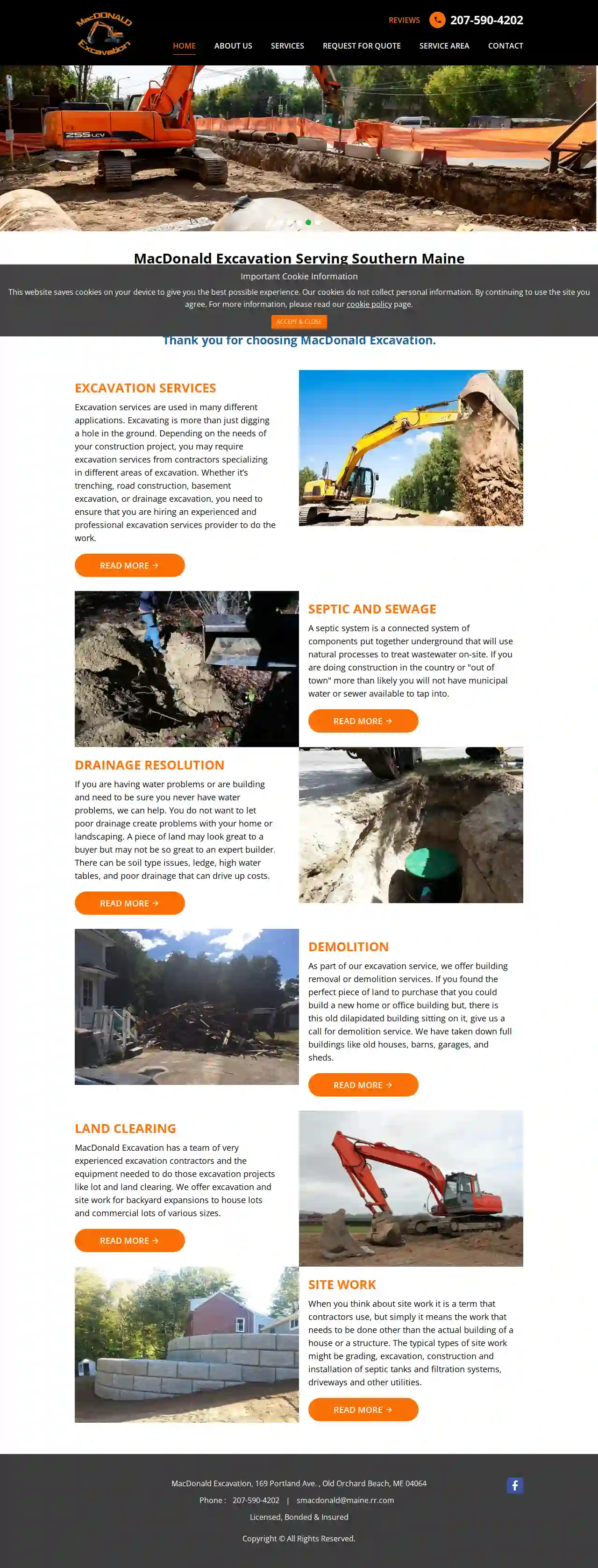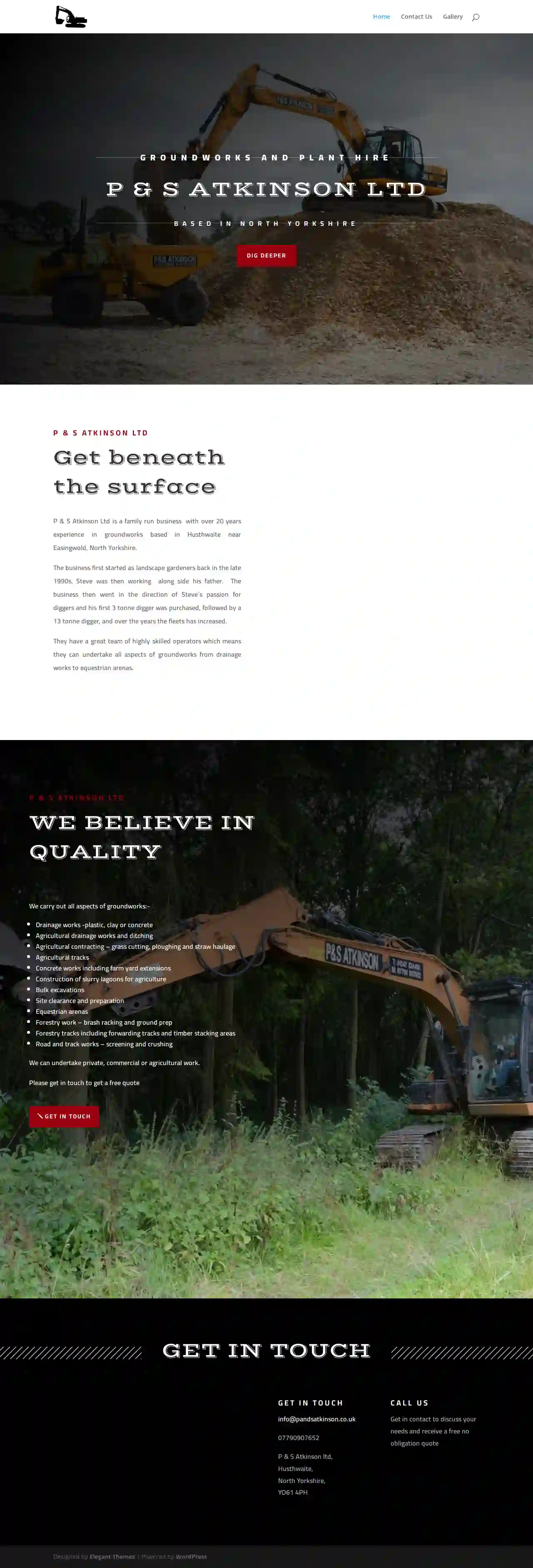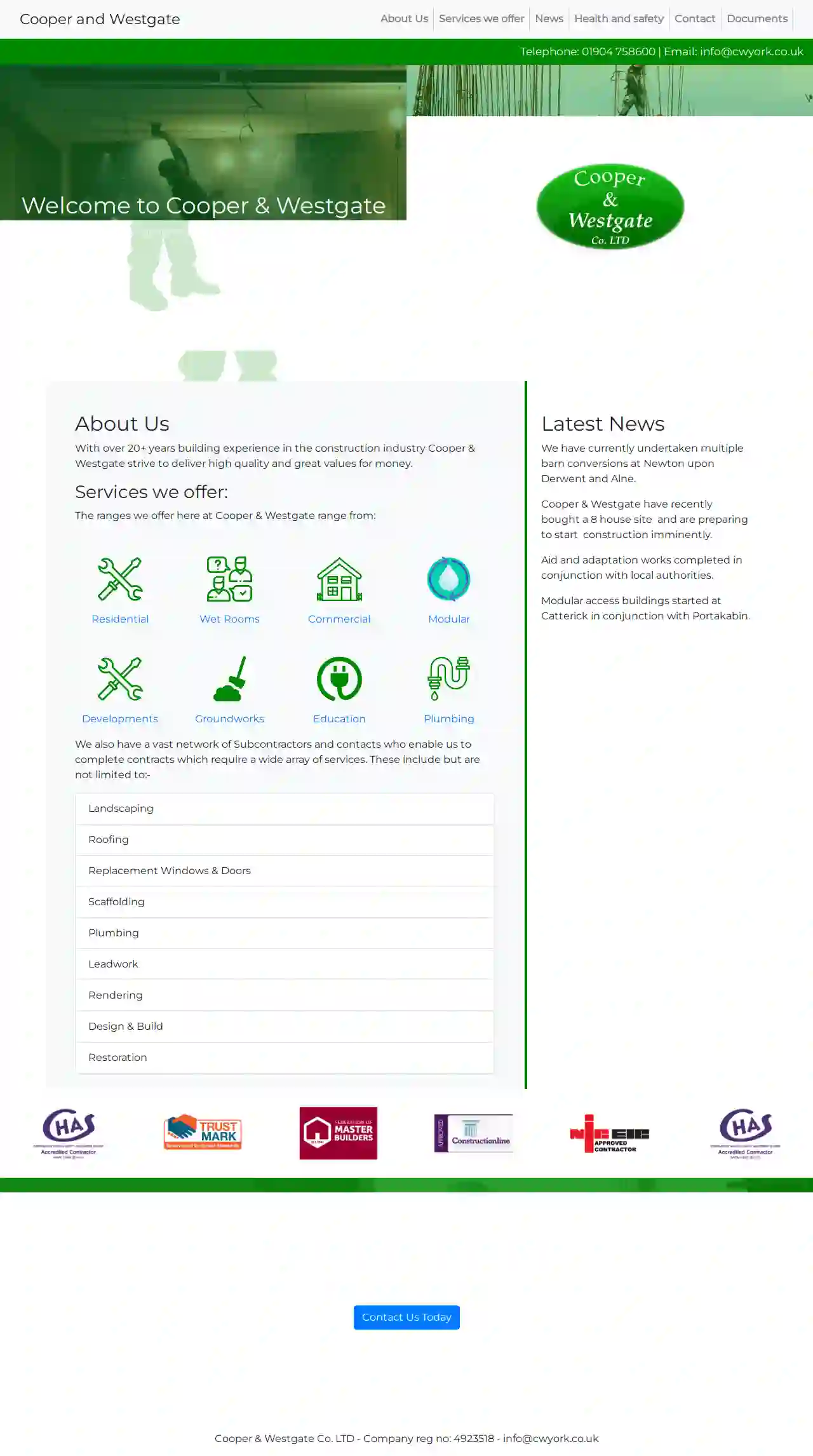Excavation Contractors Strensall
Best Excavation Services in Strensall
Get multiple Excavating Contractors quotes for your project today! Compare profiles, reviews, accreditations, portfolio, etc... and choose the best service.

Aggregate Recycling (UK) Ltd
3.85 reviewsBack Road, Wilberfoss, York, YO41 4DD, GBAggregate Recycling UK operate a fully licensed Inert Landfill, Aggregate Recycling and Treatment Facility within North Yorkshire. Based near York we have one of the largest clay pits in the area, supplying clay for all your engineering and domestic needs. We operate a modern fleet of 8 Wheeler Tippers and Grab Wagons, available for undertaking bulk and one off muck away projects. Aggregate Recycling can supply and deliver clean and recycled aggregates, sand and top soil and provide a means for crushing and screening of your demolition and excavation wastes. Contact us today with your enquiries. We Supply Supplying The Following Aggregates: Quarried & Recycled Stone - We supply Type 1 Stone 10/20/40mm Clean Stone Topsoil, Fill Sand, Building Sand Road Planings Asphalt Plants on site producing Tarmac base course 20m Weighbridge facilities on site Tarmac supplier Also Supplying: Road Scalpings Puddle Clay Pipe Bedding Building Supplies Sands Soft & Grit Building Sand Grab Hire Stone Supplies Crushed Brick Fill Material Muck Away / Cart and Tip muck away Clay and Engineering Clay Landfill Site Recycling Yard Free Tip For Clean Hardcore Grab Wagon Hire We specialise in providing professional, punctual and reliable muck away grab wagon hire for both commercial and domestic customers and as such are available for hire per load or on daily hire.
- Services
- Why Us?
- Gallery
Get Quote
Northstar Civil Engineering Ltd.
52 reviewsLauren House, Suite 137A Wakefield Road, Fenay Bridge, Huddersfield, HD5 0AN, GBWe are Northstar Civil Engineering Ltd YOUR PARTNER IN CONSTRUCTION We are a civil engineering and construction company working within Yorkshire and the surrounding areas. With the experience and expertise that Northstar Civil Engineering has to offer, we undertake most forms of Civil Engineering. We are fully accredited, trained professionals in all manner of civil engineering and groundworks projects using modern machinery and best practises, we can complete the job efficiently with the highest degree of excellence. Our genuine passion for construction along with our experience and diligence plays a huge role in our ability to complete projects on time and within budget whilst not compromising on the quality of our services. LOOKING FOR A CIVILS CONTRACTOR FOR YOUR NEXT PROJECT? Speak to our one of team today for a quotation
- Services
- Why Us?
- Gallery
Get Quote
Clear Gardens - Landscape Gardeners Hull
4.421 reviews14 Aberford Walk, Hull, HU9 5EN, GBOur History Established in 1997, Clear Gardens has been providing all types of Landscape Gardening services to Hull and the East Riding of Yorkshire for over 20 years. We are a small, fully qualified and experienced team of professionals, undertaking all types of gardening contracts, whether it's a patch of grass being turned into a driveway or a rickety old fence being replaced with quality treated timber. We can help you. We've been called "The Best Gardeners in Hull" - contact us today to find out why! How we work We work from start to finish to ensure our customers are happy with the project and in control the entire time. We offer a wide range of services to both commercial and residential customers.
- Services
- Why Us?
- Gallery
Get Quote
Fitzgerald & Sons Excavation LLC
52 reviewsBeverly, GBFitzgerald & Sons Excavation, LLC Proudly Serving the North Shore area for any of your excavation needs. Call or text to book your free estimate!
- Services
- Why Us?
- Gallery
Get Quote
Garry Scott Groundworks, Landscaping and Maintenance
412 reviews29 Inghead Rd, SlaithwaiteHuddersfield, West Yorkshire, Huddersfield, HD7 5DS, GBGarry Scott Groundworks, Landscaping and Maintenance, Huddersfield, offer a wide range of outdoor services across West Yorkshire. From tarmacing and concreting to grounds maintenance and fencing, we can transform any outdoor space, whether it's for commercial purposes, such as all-weather sports pitches and snow clearing, or block paving the garden at home, we're here to help. We're a Huddersfield based company with a reputation for high standards and excellent service. Keeping our customers happy is our top priority. We have more than 15 years' experience and our fully trained team can work closely with you to fulfil your requirements. We've worked on a wide range of projects, including demolition, construction, masonry works and landscaping at homes around West Yorkshire. We offer no-obligation, free, professional advice on our full range of services and we are more than happy to help with any questions you may have. Take a look at our services to see how we can help you or download our brochure below if you are short on time.
- Services
- Why Us?
- Gallery
Get Quote
MacDonald Excavation, Excavating Contractors in Cumberland & York County
51 reviews169 Portland Ave., Old Orchard Beach, 04064, GBMacDonald Excavation Serving Southern Maine MacDonald Excavation is a full-service excavation contractor providing residential excavation services and commercial excavation services to southern Maine for over 25 years. With our expert excavation experience, we service homeowners, contractors, builders and towns to provide the skill needed for small yard projects to larger projects that require licensing, bonding and safety regulations. Thank you for choosing MacDonald Excavation.
- Services
- Why Us?
- Gallery
Get Quote
DHMS
4.611 reviewsThormanby, York, Sycamore Grange, YO61 4NN, GBAbout DH Multiservices Ltd Established over 20 years ago, DH Multiservices Ltd now has bases in Thirsk, Easingwold and Northallerton. Our highly skilled team of landscaping professionals have been serving clients throughout North Yorkshire & the North East. We pride ourselves on providing a comprehensive range of landscaping and horticultural services, catering to both commercial and domestic clients. Whether you're looking to create a stunning new garden, enhance your existing outdoor space, or require expert groundworks, we have the expertise and experience to deliver exceptional results. Our commitment to quality, attention to detail, and customer satisfaction has earned us a reputation as a trusted and reliable landscaping company in the region. We are fully insured and qualified in all aspects of horticulture, ensuring that your project is completed to the highest standards. From initial design concepts to the final touches, we work closely with our clients to understand their vision and bring it to life. Our team is dedicated to providing a friendly and professional service, ensuring that your experience with DH Multiservices Ltd is enjoyable and stress-free. We offer a range of services including: • Groundworks • Domestic Landscaping • Commercial Landscaping • Drives • Patios & Paving • Fencing • Walls & Steps • Tree Works • Turfing • Hedge Cutting • Sports Pitch/Court Installation We are committed to providing our clients with the highest quality services and exceptional customer care. Contact us today to discuss your landscaping needs and receive a free, no-obligation quote.
- Services
- Why Us?
- Testimonials
- Gallery
Get Quote
York Osteoarchaeology Ltd
4.73 reviewsIvy Cottage, 75 Main Street, Ivy Cottage · 75 Main Street · Bishop Wilton · York, York, YO42 1SR, GBYork Osteoarchaeology York Osteoarchaeology is a leading specialist in the excavation, processing, analysis, reporting and publication of human remains. We are the largest independent osteoarchaeological company in the UK. We provide professional osteological services to archaeological contractors and academic institutions, including: Advice for pre-contract planning On-site consultation Assessment of burials in situ Excavation, lifting and processing of burials Osteological and palaeopathological analysis Analysis of inhumed and cremated human remains Integration of results with the archaeological context Research and comparative analysis Reappraisal of existing collections Preparation of exhibitions and museum displays Presentation of results in reports, publications and lectures Additional research using biomolecular analyses
- Services
- Why Us?
Get Quote
P & S ATKINSON LTD
Husthwaite, Easingwold, YO61 4PH, GBP & S Atkinson Ltd Get beneath the surface P & S Atkinson Ltd is a family-run business with over 20 years of experience in groundworks based in Husthwaite near Easingwold, North Yorkshire. The business first started as landscape gardeners back in the late 1990s, Steve was then working alongside his father. The business then went in the direction of Steve's passion for diggers and his first 3-tonne digger was purchased, followed by a 13-tonne digger, and over the years the fleet has increased. They have a great team of highly skilled operators which means they can undertake all aspects of groundworks from drainage works to equestrian arenas.
- Services
- Why Us?
- Gallery
Get Quote
Cooper & Westgate Co. Ltd
32 reviewsUnit L Barfield Industrial Estate, New Lane Huntington York, Unit L Barfield Industrial Estate New Lane Huntington York, York, YO32 9TB, GBAbout Cooper & Westgate With over 20 years of experience in the construction industry, Cooper & Westgate is dedicated to delivering high-quality projects that offer exceptional value for money. We are committed to exceeding client expectations and building lasting relationships. Our team of skilled professionals possesses a wide range of expertise, enabling us to handle diverse construction projects with precision and efficiency. We take pride in our attention to detail, ensuring that every project is completed to the highest standards. We understand that construction projects can be complex and require careful planning and execution. That's why we work closely with our clients throughout the entire process, from initial design to final completion. Our transparent communication and collaborative approach ensure that your vision is realized seamlessly. At Cooper & Westgate, we are passionate about building structures that stand the test of time. We use only the finest materials and employ the latest construction techniques to create durable and aesthetically pleasing results. Our commitment to sustainability is reflected in our responsible sourcing practices and energy-efficient designs. Whether you are looking for a residential renovation, a commercial development, or a specialized project, Cooper & Westgate has the expertise and experience to deliver exceptional results. Contact us today to discuss your construction needs and let us help you bring your vision to life.
- Services
- Why Us?
- Gallery
Get Quote
Over 13,059+ Excavation Contractors in our network
Our excavation pros operate in Strensall & surroundings!
ExcavationHQ has curated and vetted the Best Excavation Pros arround Strensall. Find a top & reliable contractor today.
Frequently Asked Questions About Excavation Contractors
- Mechanical Excavation: Utilizing heavy equipment like excavators, backhoes, bulldozers, and loaders, suitable for most projects.
- Hand Excavation: Using hand tools (shovels, picks) for smaller excavations or delicate work near utilities.
- Blasting: Employing explosives to break up rock or hard materials, typically for large-scale projects.
- Hydro Excavation: Using high-pressure water jets to loosen and remove soil, often used for locating utilities or delicate excavation.
- Vacuum Excavation: Employing a vacuum system to suck up excavated material, suitable for safe excavation near utilities or in confined spaces.
- Determine the Area: Measure the length and width of the area you want to fill. Multiply them to get the area in square feet (or meters).
- Determine the Depth: Measure the difference between the existing grade and the desired grade (how much you need to raise the ground). This is the depth of fill required.
- Calculate Volume: Multiply the area (step 1) by the depth (step 2) to get the volume in cubic feet (or meters).
- Account for Compaction: Fill dirt compacts when it settles, so add 10% to 25% to the calculated volume to account for compaction. The exact percentage depends on the type of fill material.
- Planning and Surveying: Defining the excavation area, marking utility lines, and determining the required depth and grade.
- Site Preparation: Clearing vegetation, removing obstacles, and ensuring site accessibility.
- Excavation: Using appropriate equipment (excavators, backhoes, etc.) to remove earth and create the desired excavation.
- Hauling and Disposal: Transporting excavated material to designated disposal sites, complying with environmental regulations.
- Backfilling and Compaction: Refilling the excavation with suitable material and compacting it to achieve the required density and stability.
- Grading and Finishing: Leveling and shaping the surface to the final grade for landscaping or construction.
What are the different methods of excavation?
How do I calculate how much dirt I need for fill?
What is the excavation process?
What is the difference between excavation and grading?
Excavation: Primarily involves removing earth or other materials from a site. It's about digging down and creating space.
Grading: Focuses on shaping and leveling the ground to a specific slope or elevation. It's about adjusting the existing terrain.
For example, you might excavate a foundation and then grade the surrounding area to ensure proper drainage and a level surface for landscaping.
What are the different methods of excavation?
- Mechanical Excavation: Utilizing heavy equipment like excavators, backhoes, bulldozers, and loaders, suitable for most projects.
- Hand Excavation: Using hand tools (shovels, picks) for smaller excavations or delicate work near utilities.
- Blasting: Employing explosives to break up rock or hard materials, typically for large-scale projects.
- Hydro Excavation: Using high-pressure water jets to loosen and remove soil, often used for locating utilities or delicate excavation.
- Vacuum Excavation: Employing a vacuum system to suck up excavated material, suitable for safe excavation near utilities or in confined spaces.
How do I calculate how much dirt I need for fill?
- Determine the Area: Measure the length and width of the area you want to fill. Multiply them to get the area in square feet (or meters).
- Determine the Depth: Measure the difference between the existing grade and the desired grade (how much you need to raise the ground). This is the depth of fill required.
- Calculate Volume: Multiply the area (step 1) by the depth (step 2) to get the volume in cubic feet (or meters).
- Account for Compaction: Fill dirt compacts when it settles, so add 10% to 25% to the calculated volume to account for compaction. The exact percentage depends on the type of fill material.
What is the excavation process?
- Planning and Surveying: Defining the excavation area, marking utility lines, and determining the required depth and grade.
- Site Preparation: Clearing vegetation, removing obstacles, and ensuring site accessibility.
- Excavation: Using appropriate equipment (excavators, backhoes, etc.) to remove earth and create the desired excavation.
- Hauling and Disposal: Transporting excavated material to designated disposal sites, complying with environmental regulations.
- Backfilling and Compaction: Refilling the excavation with suitable material and compacting it to achieve the required density and stability.
- Grading and Finishing: Leveling and shaping the surface to the final grade for landscaping or construction.
What is the difference between excavation and grading?
Excavation: Primarily involves removing earth or other materials from a site. It's about digging down and creating space.
Grading: Focuses on shaping and leveling the ground to a specific slope or elevation. It's about adjusting the existing terrain.
For example, you might excavate a foundation and then grade the surrounding area to ensure proper drainage and a level surface for landscaping.